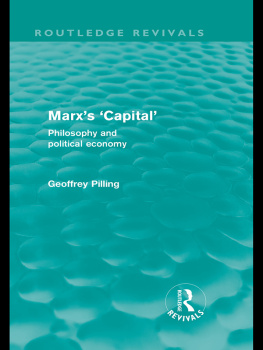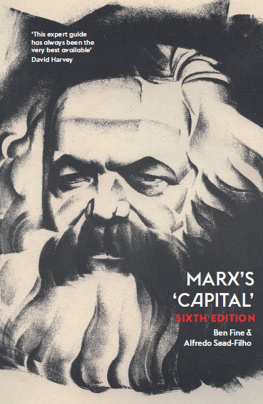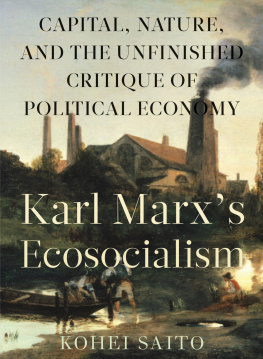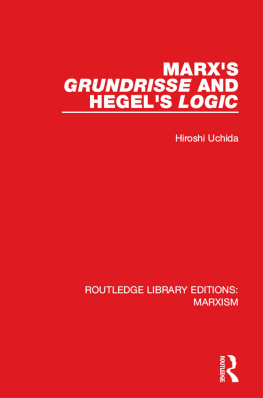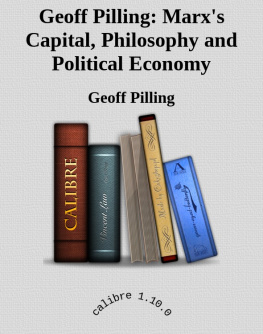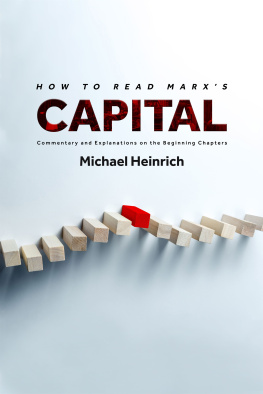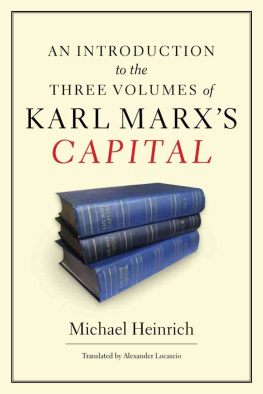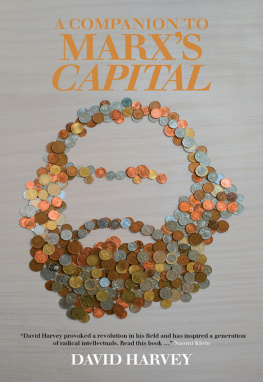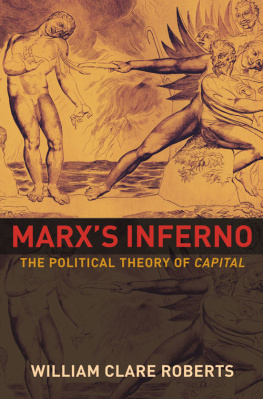Routledge Revivals
Marxs Capital
This revival of a systematic study by Geoffrey Pilling, originally published in 1980, argues powerfully that, in order to understand Marxs Capital fully, it is necessary to have first read and understood Hegels Logic. This argument leads to a detailed examination of the opening chapters of Capital, and a re-examination of their significance for the work as a whole.
Pilling emphasizes the fundamental nature of the break between Marxs Capital and all forms of classical political economy, and stresses the revolutionary nature of Marxs critique of political economy as one of the foundations of Capital. He also lays particular emphasis on the philosophical aspects of the work, so often neglected by British commentators, and puts forward the view that Marxs notion of fetishism, often looked upon as incidental to his work, is in fact central to his entire critique of political economy.
MarxsCapital
Philosophy and political economy
Geoffrey Pilling

First published in 1980
by Routledge & Kegan Paul Ltd
This edition first published in 2010 by Routledge
2 Park Square, Milton Park, Abingdon, Oxon, OX14 4RN
Simultaneously published in the USA and Canada
by Routledge
270 Madison Avenue, New York, NY 10016
Routledge is an imprint of the Taylor & Francis Group, an informa business
This edition published in the Taylor & Francis e-Library, 2010.
To purchase your own copy of this or any of Taylor & Francis or Routledges collection of thousands of eBooks please go to www.eBookstore.tandf.co.uk.
1980 Geoffrey Pilling
All rights reserved. No part of this book may be reprinted or reproduced or
utilised in any form or by any electronic, mechanical, or other means, now
known or hereafter invented, including photocopying and recording, or in any
information storage or retrieval system, without permission in writing from the
publishers.
Publishers Note
The publisher has gone to great lengths to ensure the quality of this reprint but
points out that some imperfections in the original copies may be apparent.
Disclaimer
The publisher has made every effort to trace copyright holders and welcomes
correspondence from those they have been unable to contact.
ISBN 0-203-85727-5 Master e-book ISBN
ISBN 13:978-0-415-57101-2 (hbk)
ISBN 13:978-0-203-85727-4 (ebk)
ISBN 10:0-415-57101-4 (hbk)
ISBN 10:0-203-85727-5 (ebk)
Marxs Capital
MarxsCapital
Philosophy and political economy
Geoffrey Pilling
Senior Lecturer in Economics, Middlesex Polytechnic

Routledge & Kegan Paul
London, Boston and Henley
First published in 1980
by Routledge & Kegan Paul Ltd
39 Store Street,
London WC1E 7DD,
9 Park Street, Boston, Mass. 02108, USA and
Broadway House,
Newtown Road,
Henley-on-Thames,
Oxon RG9 1EN
This edition published in the Taylor & Francis e-Library, 2010.
To purchase your own copy of this or any of Taylor & Francis or Routledges collection of thousands of eBooks please go to www.eBookstore.tandf.co.uk.
Set in 10/12 Linotron 202 Sabon by
Input Typesetting Ltd, London
and printed in Great Britain by
Redwood Burn Ltd
Trowbridge & Esher
Geoffrey Pilling 1980
No part of this book may be reproduced in
any form without permission from the
publisher, except for the quotation of brief
passages in criticism
British Library Cataloguing in Publication Data
Pilling, Geoffrey
Marxs Capital.
1. Marx, Karl. Kapital, Das
I. Title
335.4 HB501.M37 80 40198
ISBN 0-203-85727-5 Master e-book ISBN
ISBN 0 7100 0516 4
Contents
Acknowledgments
Many people have helped directly or indirectly in what follows. For several years I have enjoyed the pleasure and benefit of joint theoretical and political work with Cliff Slaughter, Tom Kemp and Cyril Smith. It was Tom who first interested me in Capital through a series of classes he gave while I was a student in Leeds. Many of the things I have been taught by them are certainly present in the following. But I must stress that none of them saw this work in either draft or final form. So it is necessary to go beyond a usual formal disclaimer and make clear that they are in no sense responsible for any of its weaknesses. I am grateful to Madeleine Wahlberg for reading a draft of and making helpful comments on its content and style. Part of the material formed the basis of a series of lectures given in Middlesex Polytechnic and I thank those students who sharpened and clarified my ideas in the course of many discussions. Finally my thanks to Frances Dolan for all her help in the preparation of the manuscript.
The author and publishers would like to thank Lawrence & Wishart Ltd for permission to quote from their editions of Capital, Parts 13, and Theories of Surplus Value, Parts 13.
List of abbreviations
The following abbreviations have been used throughout the text:
I | Capital, I, Lawrence & Wishart, London, 1961 |
II | Capital, II, Lawrence & Wishart, London, 1957 |
III | Capital, III, Lawrence & Wishart, London, 1959 |
G | The Grundrisse, Penguin, Harmondsworth, 1973 |
LCW | The Collected Works of Lenin (in 50 Volumes) London, Lawrence & Wishart |
Introduction
After more than thirty post-war years, during which time most commentators believed that the oustanding questions in economic theory had been resolved, considerable doubt once again pervades the subject. In the opinion of increasing numbers, economics has singularly failed to find any coherent answers to the mounting problems facing capitalist economy throughout the world. Our purpose is not to examine this crisis in conventional economic theory, but we can certainly note the growing scepticism about the ability of Keynesianism to provide the basis for a viable economic policy in the capitalist world. After years during which it was complacently taken as read that Keynes had answered Marx many now see in Keynesian deficit financing the source of the inflationary pressures currently threatening the stability of the western monetary system. Apart from this question of Keynesianism, of equal significance has been the attack launched against several of the principal tenets of neo-classical theory. It has been argued, for instance, that attempts to relate the return to capital to its contribution are based upon circular reasoning, since it is impossible to conceive this return independently of the rate of profit. Other serious blows have also been struck at the marginal productivity theory of distribution in so far as it has been demonstrated that no unique relationship holds between the degree of capital intensity and the distribution of income. One effect of this work (for a selection see Hunt and Schwartz, 1972) has been seriously to undermine one traditional neo-classical justification for the existing pattern of income distribution by reference to technology.

